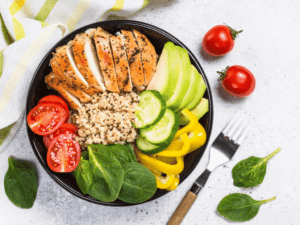As we get older, the way we treat our bodies affects how we feel.
A week with no exercise leads to an achy, sore back. A night of poor sleep leaves us feeling sluggish and distractible. An inadequate diet leads to energy dips and poor body condition.
The latter is what we’re here to talk about today.
While a healthy diet is essential at all stages of life, protein is one nutrient that becomes more critical as we age. In fact, experts recommend we eat more protein as we age.
Besides sustaining muscle mass, protein staves off the aging process, supports bone health and facilitates other essential physiological functions.
This article will discuss the importance of protein, how much of it you should consume, and more.
What is Protein, and Where Does it Come From?
Protein is present in our muscles, skin, hair, bones, and virtually every other tissue in the human body. There are over 10,000 different proteins in the human body.
Protein is an essential nutrient because it contains the enzymes that facilitate many of the body’s most critical chemical reactions and the hemoglobin that’s responsible for carrying oxygen in the blood.
In addition, protein is an excellent source of amino acids. Since the human body doesn’t store amino acids, we need to get at least nine essential amino acids from high-protein food sources – including lysine, tryptophan, and valine.
For people who want to eat a high-protein diet, excellent sources include lean meats, poultry, fish and seafood, dairy products, soy, and legumes.
How Much Protein Do You Need?
For optimal physical condition and function as you age, we recommend consuming at least 1 gram of protein per pound of bodyweight each day.
Other sources, such as The National Academy of Medicine, recommend that adults consume at least 9 grams of protein for every 20 pounds of body weight. The actual amount of protein you need depends on your age, your activity level, your gender, and your unique body composition.
Talk to a dietician or personal trainer if you’re not sure how much protein you should be consuming. They’ll be able to provide recommendations and help you stay on track.
3 Benefits of Eating More Protein
Wondering why getting older demands more protein in your daily diet? Here are a few of the biggest perks:
1. Protein improves your executive function
According to a 2018 study that examined 2,900 seniors over 23 years, people who ate more protein were 30% less likely to become functionally impaired than people who ate less protein.
Function is everything as we age. It determines our ability to dress and feed ourselves, climb a flight of stairs, and play with our grandkids. Fortunately, protecting those abilities could be as simple as focusing more on your daily protein intake.
2. Protein preserves muscle mass
It’s sad but true: we naturally lose muscle mass as we age. We lose as much as 3%-5% of our muscle mass per decade after age 30. Fortunately, protein can help stop or slow that process.
When we consume protein, our bodies break it down into amino acids, which are then used to build muscle. Eating enough protein supports muscle generation and allows you to maintain the muscle mass you’ve already worked so hard to build.
3. Certain protein sources reduce the risk of premature death
According to a 2016 study that reviewed the protein intakes of 131,000 women over 32 years, women who consumed high-quality protein from plant foods had a lower risk of premature death than women who consumed protein as red meat.
The moral of the story: protein is important for a long, healthy life, but where you get it matters.
Tips for Adding More Protein to Your Diet
Want to add more protein to your plate? Follow these tips:
1. Opt for healthy alternatives
Look for opportunities to eat protein with every meal and snack. Legumes, seeds, whole grains, and other plant-based protein sources are easy to grab and go and simple to incorporate into most meals. For example, add a handful of walnuts to your morning oatmeal, smear some almond butter on an apple as a snack, or add some pea protein to your favorite shake.
2. Consider the protein “package”
Very few foods are pure protein. That means that when you consume protein, you’re also eating everything that comes as a “package” alongside it: all the sodium, fats, fiber, and other nutrients the food contains. That’s why thinking about protein as a package is so important.
Here’s an example: a 4-ounce broiled sirloin steak contains 33 grams of protein and 5 grams of saturated fat. In comparison, 4 ounces of grilled salmon contains about 30 grams of protein and only 1 gram of saturated fat.
Here’s the bottom line: pick protein sources that offer a “package” that provides the most beneficial nutrients for your body.
3. Don’t be afraid to supplement
If you’re struggling to get enough protein from whole food sources, look for protein supplements that can help you hit the mark. Protein powders are easy to mix into oatmeal, smoothies, and shakes and can pack as much as 30 grams of protein per scoop.
Protein: The Foundation for Active Aging
While getting older is inevitable, feeling older isn’t. When you move your body often and fuel it well, you’ll be able to keep doing the things you love for many years to come. By simply upping your protein intake and focusing on resistance training to build strength and preserve muscle mass, you can avoid many of the aches, pains, and dangers of aging, including falls and decreased mobility.Want to learn more about these topics or how to stay active as you get older? Find an Alloy location near you now! We’re happy to create a personalized training plan and take control of your health – starting now.




